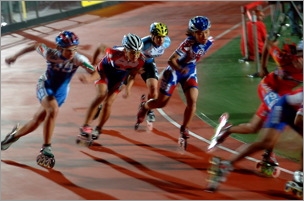 | ||
| ||||||||
By Gypsy Tidwell
To the Swift - Elite women sprintingf at the 2006 World Championships in Anyang, South Korea. You may be the strongest skater from here to Egypt. But if a faster sprinter hangs with you until the finish of a race, it's likely to be the sprinter — not you — who rolls away with the trophy. The tortoise may have the advantage in running races. But in skate races with drafting, the hare is the winner. That's why learning to sprint is so important. It's also fun and a great way to get a quick workout. So even if you're not a racer, make sprint training a part of your skating routine. Getting Started A full-blown sprint workout can take three hours or more. But if you don't have that much time, don't worry. You can break it up over the course of a few days. The key to sprint workouts is to allow yourself to completely recover between each sprint. This is important so that you can go 100 percent on each sprint, which teaches your muscles what it feels like to go fast. Here's what a full sprint practice looks like:
In between each sprint, allow your heart rate to return to its resting rate. This will take from two to five minutes, depending on your age and conditioning. That means you'll spend more time resting than skating. But later, you will find you need less time to recover. Spread It Out If you don't have time for a full sprint workout, break it up into pieces. Do the 100m and 200m sprints on the first day; do a long-distance skate on the second; and finish the sprint workout on the third day.
And adjust your sprint training to fit your competition schedule. Do your sprint workouts:
If you race more frequently in the early part of the year, adjust your calendar accordingly. (Note: If you have any concerns about your health, check with your doctor before starting any rigorous exercise regime.)
---
Related reading: • Skate Tip of the Week Archive
...
Copyright © 2011 Inline Planet | ||||||||


 Gypsy Lucas Tidwell is a former World Champion speed skater and member of the USA Roller Sports Hall of Fame. She grew up skating at her parents' roller rinks in Texas, where her father still coaches the indoor team in Waco. She went on to compete in both figure and speed skating. In the 1990s, she won three gold medals at the speed World Championships, four gold medals at the Pan American Games and two gold medals in the X Games. After retiring from racing, she served stints as the coach of the U.S. World Team. For the last four years, she has been working at the Royal Beach Casino on the island of St. Kitts..
Gypsy Lucas Tidwell is a former World Champion speed skater and member of the USA Roller Sports Hall of Fame. She grew up skating at her parents' roller rinks in Texas, where her father still coaches the indoor team in Waco. She went on to compete in both figure and speed skating. In the 1990s, she won three gold medals at the speed World Championships, four gold medals at the Pan American Games and two gold medals in the X Games. After retiring from racing, she served stints as the coach of the U.S. World Team. For the last four years, she has been working at the Royal Beach Casino on the island of St. Kitts..